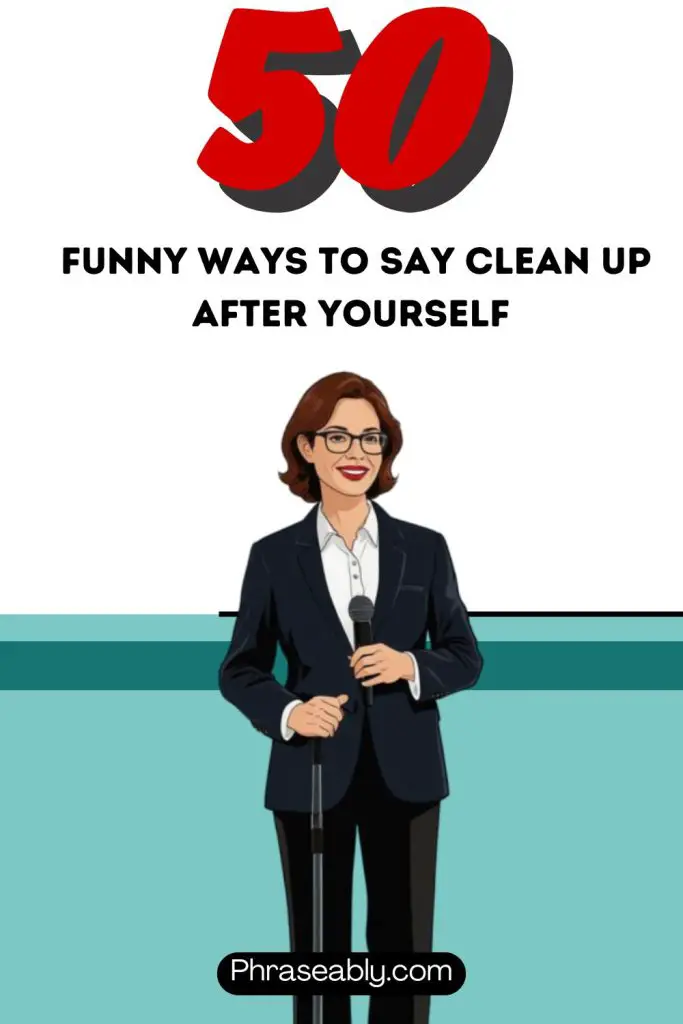Do you have a friend or family member who always finds it difficult to clean up the mess they made?
Whether the mess is made in their room, after using the kitchen or toilet, the point is that it can be very annoying. That doesn’t mean you can’t express your displeasure in a funny way.
This article shows you how to tell someone that they should clean up after themselves in a lighthearted way in order not to stir up conflict and to maintain a positive environment.
A few or more amongst these phrases will come in handy if you find yourself in that situation.
Underneath each phrase are examples on how to make use of them in a sentence in order to tidy up the situation well (deliver a funny statement).
Humorous Ways To Say Clean Up After Yourself
I present to you funny ways to say that someone should clean up after himself or herself.
- Your mess, your stress—tidy it up.
- Let’s pretend you’re not a tornado and clean up.
- I’m assuming you think I’m your maid right, well I’m not.
- Your mom doesn’t live here, so clean up.
- I think you dropped something… everywhere.
- Unless you’ve hired a butler, pick up your stuff.
- Clean up before and after yourself.
- Even the garbage would judge this mess.
- Please make this mess disappear.
- Ants are being summoned, please clean up.
- It’s like you’re leaving breadcrumbs, but for what?
- Cleaning is not a big word to understand.
- Don’t you get irritated in messy places?
- This place is one hell of a disaster, clean it up.
- Since you learnt how to create a mess you should learn how to end it.
- I’m sure godliness isn’t next to you.
- You love the mess, then marry the cleaning of it.
- You keep forgetting to clean up, forget how to make a mess as well.
- Make your hands keep the dirt away.
- You must really hate being clean.
- Try to get yourself familiar with the trash can.
- Tidy up before the mess tidy’s you up.
- Even your mess wants to leave the room.
- If only your stuff could walk itself away…
- Clean up after yourself, emphasis on yourself.
- I am certain the room hates you anytime you step in.
- Let your hands learn how to pick the mess you made.
- Keep the cleaning going, don’t stop.
- Your mess has to be cleared or it will clear you.
- Don’t lie, you are intentionally polluting your room right?
- After you leave the kitchen it’s not a princess turning to an ogre, please clean.
- You should be proud that you now have a stack of something, not money, but trash.
- You turned your place into a spacious trash bag, well done.
- The only thing you do after yourself is to mess things up.
- Do the impossible, do the dishes.
- Even a haunted house is less scarier than this mess.
- You’re messed up, literally, fix it.
- You should put your dishwasher to good use, don’t you think.
- Please introduce your mess to the trash can, will you?
- Your room is begging for mercy, please clean me!
- “I think you should try new things like cleaning up after yourself.
- This mess must be no different from your mind, clustered.
- Put away your stuff or risk being put away.
- Cleaning is a good thing, you know that right?
- You’re the root of the mess, cut it out.
- You either clean this up or clean this up now.
- You are as neat as a pig, impressive.
- This is a mess that’s messed up.
- The floor must miss being mopped.
- Are you sure you have a nose to smell this mess and the eyes to see it?
Your mess, your stress—tidy it up.
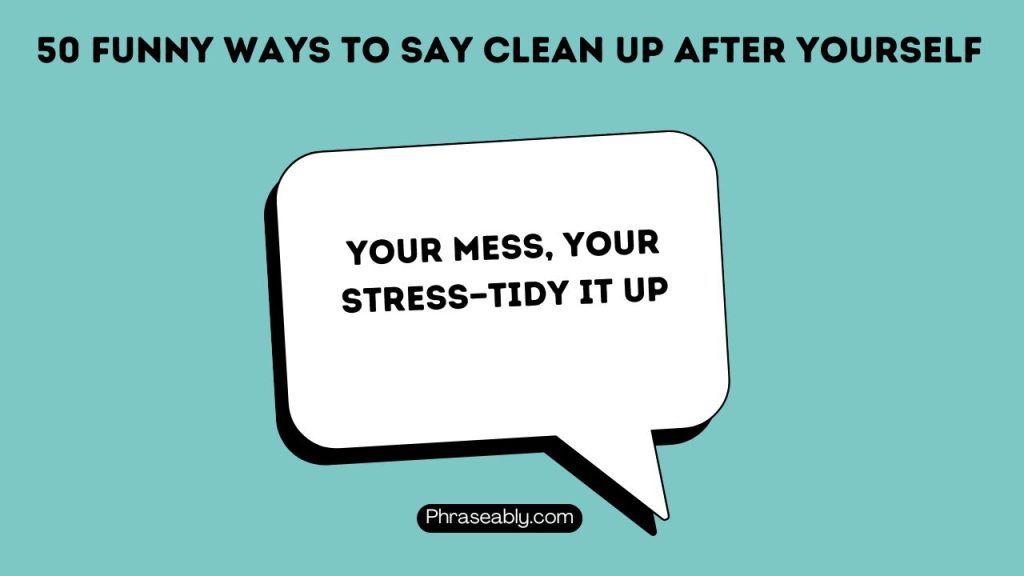
The rhythm pattern between the word “mess” and “stress” highlight the humor in this phrase.
If you have a friend who’s dirty and does not like to clean up after themselves, you can tell them playfully this way.
How To Use:
- Don’t yell at me about this, it’s your mess, your stress so tidy it up.
Let’s pretend you’re not a tornado and clean up.
A tornado is a natural disaster whereby a heavy amount of wind occurs and causes a huge mess.
This phrase plays with the idea that if only the person is a natural disaster that can’t be controlled, that’s only when it’s possible not to clean up after themselves.
How To Use:
- Let’s pretend you’re not a tornado and clean up after yourself, it’s that simple.
I’m assuming you think I’m your maid right, well I’m not.
Only a maid is obligated to clean up after their employer’s mess and this phrase shows that that isn’t the case.
If you’re good with sarcasm, you’ll find this phrase very useful.
How To Use:
- I’m assuming you think I’m your maid right, well I’m not, so pick up the broom and start sweeping.
Your mom doesn’t live here, so clean up.
Well, you have to be close with the person if you’re going to succeed in getting someone to laugh about a joke like this.
“Mom” is a representation for nurture and pampering which you’re clearly refusing to be to the person.
How To Use:
- There’s a pile of dirty laundry in your room.Your mom doesn’t live here, so clean up.
I think you dropped something… everywhere.
Whether the humor is in your comments or in your instructions, the bottom line is that you’re not pleased with a dirty friend, relative or partner.
How To Use:
- I think you dropped something… everywhere, don’t you think?
Unless you’ve hired a butler, pick up your stuff.
Your friend would certainly smile or chuckle at a funny phrase like this one which means that they shouldn’t be messy if they haven’t hired anyone (butler) to clean it up.
How To Use:
- Unless you’ve hired a butler or a workaholic maid, please pick up your stuff on the floor.
Clean up before and after yourself.
The use of the words ‘before and after’ highlights a form of exaggeration in your friends or partner’s pattern of making a mess and not cleaning it up, this is what therefore makes it funny.
How To Use:
- You know what, at this point, I’m going to have to ask you to clean up before and after yourself.
Even the garbage would judge this mess.
This is a silly way of saying ‘clean up after yourself’ as it means that even garbage, where trash is thrown or kept, would be judgemental of how untidy they are.
How To Use:
- This kitchen is so messed up even the garbage would judge this mess.
Please make this mess disappear.
Pleading that a mess should disappear is a funny request that also means that person should clean up after themselves.
Being dramatic in your gesture goes a long way into making the phrase sound funny in a text or phone call.
How To Use:
- I can’t live in this house anymore, please make this mess disappear.
Ants are being summoned, please clean up.
Ants are known to be lovers of dirty places which figuratively means that the person you’re referring to must be a big fan of dirty places which makes the phrase funny and easy to relate with.
How To Use:
- I think that you are trying to summon ants, and should try to clean up to prevent that.
It’s like you’re leaving breadcrumbs, but for what?
“Breadcrumbs” is used to mean that there’s a trail of dirty things or objects that are being formed.
It highlights how annoying and unnecessary it is and will not be condoned.
How To Use:
- It’s like you’re leaving breadcrumbs, but for what? Your rescue from garbage kidnappers?
Cleaning is not a big word to understand.
Another funny phrase to say ‘clean up after yourself’ ‘cleaning is not a big word to understand’ as it jokes around the thought that perhaps the reason why a person refuses to stay clean is because they don’t understand the meaning.
How To Use:
- Cleaning is not a big word to understand, so why don’t you act like you get it?
Don’t you get irritated in messy places?
If you’re looking for a rhetorical question that points out in a funny way that a person needs to clean up after himself/herself, this would be the best phrase to use.
How To Use:
- Don’t you get irritated in messy places? I know that I do, like every other human being does.
This place is one hell of a disaster, clean it up.
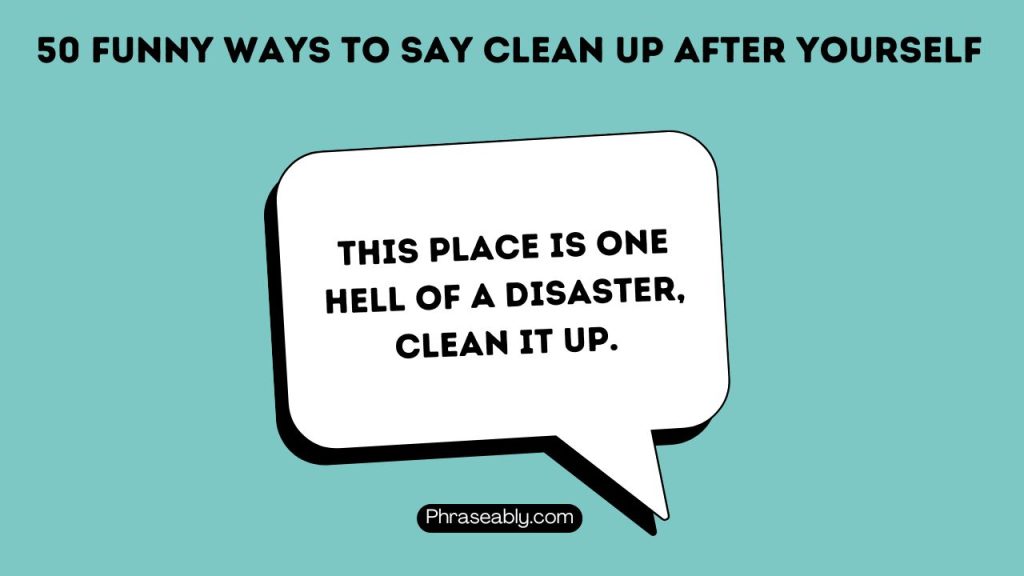
Passing down dramatic and hilarious comments about how dirty a person or place is makes this phrase easy to relate with and would come in handy in any informal setting.
How To Use:
- This place is one hell of a disaster, clean it up, and I am not even joking about it egghead.
Since you learnt how to create a mess you should learn how to end it.
It’s true that when a person knows the beginning of a certain thing, he or she should also be able to recognize the end and put it into action.
How To Use:
- Since you learnt how to create a mess you should learn how to end it, don’t you think, Inventor.
I’m sure godliness isn’t next to you.
This funny phrase is coined from the saying that goes ‘cleanliness is next to godliness.’
If you want to tell your friends about how they should learn to clean up after themselves, I suggest using this phrase.
How To Use:
- Cleanliness is next to godliness right? Well, I’m sure godliness isn’t next to you.
You love the mess, then marry the cleaning of it.
Another funny way to say that a person should clean up their own mess is by implying that he or she is in love with messing things up, but should also be committed to getting rid of it as seen in this phrase.
How To Use:
- You love the mess, then marry the cleaning of it and never get a divorce.
You keep forgetting to clean up, forget how to make a mess as well.
Your friend or partner might be giving excuses for their bad behavior, this would be a funny response to it which would lighten or help ease the tension.
How To Use:
- If you keep forgetting to clean up, forget how to make a mess as well. It’s not rocket science.
Make your hands keep the dirt away.
This is a good use of personification (giving the abilities of a human to a non-living thing).
Since the individual uses their hands to make the mess, they should also figure out how to keep it away.
How To Use:
- Make your hands keep the dirt away and if you can’t do that, restrain your hands from making the dirt.
You must really hate being clean.
Even though this sounds exaggerated, it could be deemed as funny since you’re implying that your friend or perhaps your colleague at work has a deep rooted hatred for cleaning.
How To Use:
- Every time I enter your room, it sinks into my mind that you must really hate being clean.
Try to get yourself familiar with the trash can.
“Try to get yourself familiar with the trash can” is also a funny phrase to say that a person should clean up after making a mess.
They probably should get introduced to what a trash can is since they seem to think it’s the floor or table.
How To Use:
- We all attempt to try new things everyday, why don’t you try to get yourself familiar with the trash can.
Tidy up before the mess tidy’s you up.
This phrase means that there’s a chance that the mess could start to influence or ‘tidy up’ the person you’re referring to.
How To Use:
- Tidy up before the mess tidy’s you up and I’m telling you that it’s not going to look good.
Even your mess wants to leave the room.
When you find yourself in a situation where your friend, relative or close colleague’s abode looks so unkempt, you can joke about it using this phrase.
How To Use:
- Even your mess wants to leave the room because it’s just a hassle in here.
If only your stuff could walk itself away…
Messes aren’t cleared up just wishing, it takes action which this phrase plays around to mean that a person should clean after themselves.
How To Use:
- I bet that when you’re making this mess, you say to yourself, ‘If only your stuff could walk itself away.’ Well, it can’t.
Clean up after yourself, emphasis on yourself.
You might be in a situation where you feel like you’ve repeated the same instructions over and over and the other person (friend, relative, e.t.c) isn’t listening.
This phrase helps you joke about their stubbornness.
How To Use:
- I am sure you heard when I said you should clean up after yourself, emphasis on yourself.
I am certain the room hates you anytime you step in.
Furthermore, ‘I am certain the room hates you anytime you step in’ is another phrase that means that a person’s room is a disaster and makes fun about the possibility that the room has the feelings to hate the person.
How To Use:
- Please don’t come back soon. I am certain the room hates you anytime you step in.
Let your hands learn how to pick the mess you made.
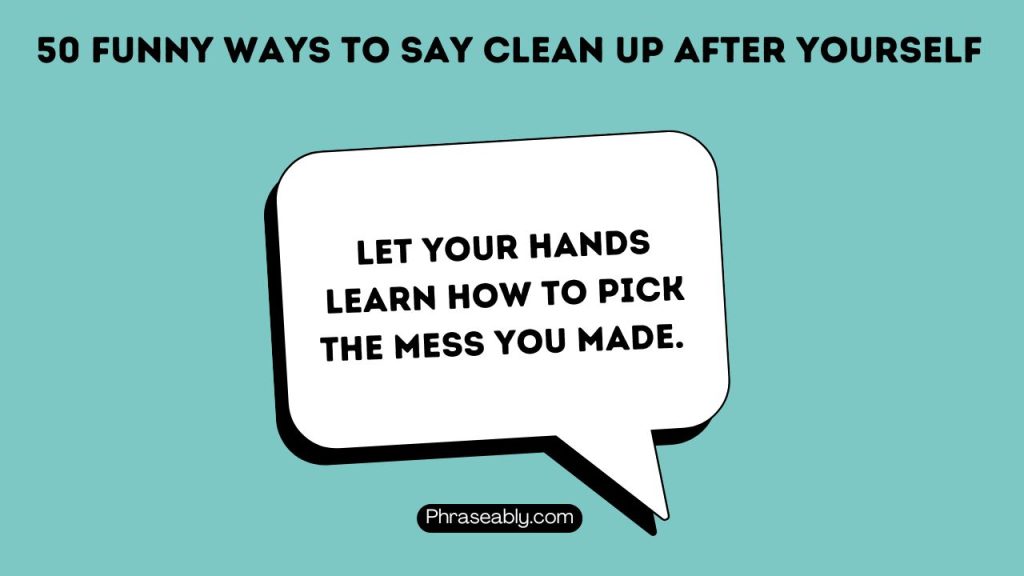
“Let your hands learn how to pick the mess you made” is another funny phrase that uses a synecdoche (using a part of a thing to represent the whole).
The hand is used to represent the person who hasn’t seemed to learn how to end the mess they make.
How To Use:
- Let your hands learn how to pick the mess you made, wouldn’t it?
Keep the cleaning going, don’t stop.
If your aim is to motivate your messy friend in a funny way, this would be the best line to use.
A good comic tone will help set the base for this funny expression.
How To Use:
- Keep the cleaning going, don’t stop, winners never quit!
Your mess has to be cleared or it will clear you.
“Your mess has to be cleared or it will clear you” is another funny phrase that means that if positive steps aren’t taken towards being clean, the person might end up dealing with a huge consequence.
How To Use:
- At this point in time, your mess has to be cleared or it will clear you.
Don’t lie, you are intentionally polluting your room right?
Sometimes you’re just in a huge disbelief of how someone you live with can be so dirty.
This funny question helps you express that feeling.
How To Use:
- Don’t lie, you are intentionally polluting your room right? This has to have been planned for it to look so bad.
After you leave the kitchen it’s not a princess turning to an ogre, please clean.
This phrase adopts a fairytale story about a beast turning to a handsome or beautiful princess magically.
It implies that when it comes to cleaning that’s not the case.
How To Use:
- Let me tell you this, after you leave the kitchen it’s not a princess turning to an ogre, please clean.
You should be proud that you now have a stack of something, not money, but trash.
This is a sarcastic way of telling someone that instead of them investing into something profitable, they choose to accumulate dirty clothes, dishes, and every other untidy stuff.
How To Use:
- It’s amazing, you should be proud that you now have a stack of something, not money, but trash.
You turned your place into a spacious trash bag, well done.
Another sarcastic and funny way to say a person should clean up after himself/herself, is through this phrase.
Maybe your sibling or friend’s place looks so dirty, you could ‘praise’ them for turning their house into a big trash bag.
How To Use:
- You turned your place into a spacious trash bag, well done, I’m proud of what you’ve done.
The only thing you do after yourself is to mess things up.
“The only thing you do after yourself is to mess things up” is an expression that is suitable for lightheartedly relaying your discomfort with someone’s inability to clean up their own mess.
How To Use:
- When I tell you to clean up after yourself, the only thing you do after yourself is to mess things up.
Do the impossible, do the dishes.
Implying that doing the dishes is impossible shows in a ridiculous way that the person has zero cleaning skills, and it is a smart way to make fun or point that out.
How To Use:
- Jesus walked on water and healed sick people, why don’t you do the impossible as well and do the dishes.
Even a haunted house is less scarier than this mess.
Even though this is just a comment about how dirty a person’s space or room is, it could also pass across the message that they should clean up after themselves as well.
How To Use:
- Even a haunted house is less scarier than this mess, did a raccoon die in here?
You’re messed up, literally, fix it.
In a conversation with your roommate perhaps while texting or video calling, you can jokingly say that they should clean up their mess using this phrase.
How To Use:
- If you ask me for my opinion I would say that you’re messed up, literally, fix it.
You should put your dishwasher to good use, don’t you think.
‘You should put your dishwasher to good use, don’t you think’ is a phrase that pokes fun at a person’s lack of knowledge on how to use the dishwasher machine which could be why they don’t clean up, or maybe not.
How To Use:
- I believe that you should put your dishwasher to good use, don’t you think?
Please introduce your mess to the trash can, will you?
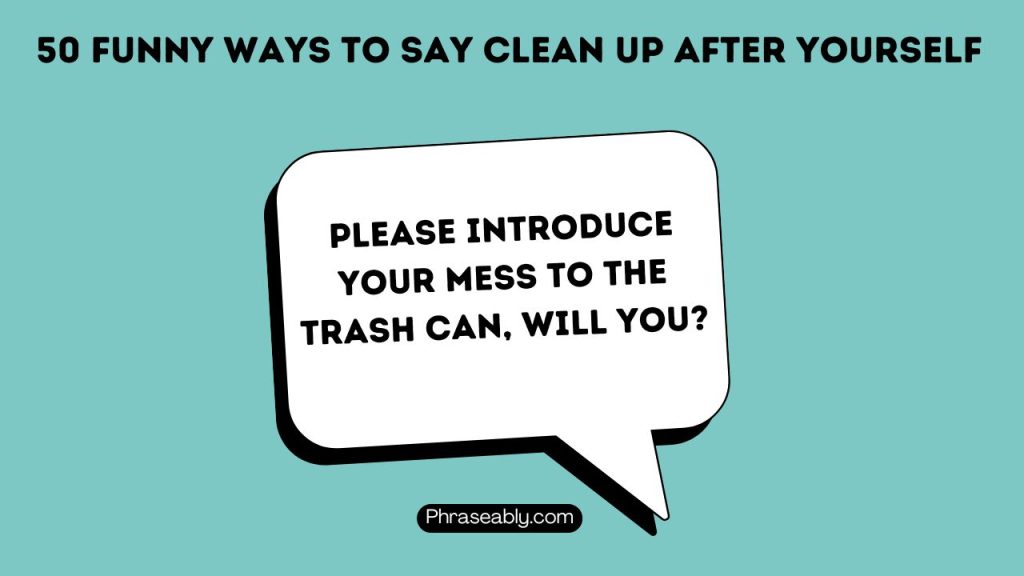
“Please introduce your mess to the trash can, will you?” is another phrase that uses an element of personification and implies that the mess or dirt made can be united with the trash where it truly belongs.
How To Use:
- Please introduce your mess to the trash can, will you? It would be the best union ever.
Your room is begging for mercy, please clean me!
When uttering this sound, you could make a dramatic face that shows how desperate the room is to get rid of all the trash in it.
Text this to your sloppy friend or roommate and see how they react.
How To Use:
- Your room is begging for mercy, please clean me! Don’t be heartless.
I think you should try new things like cleaning up after yourself.
The fact that your first suggestion when it comes to trying new things is that the individual should clean up after themselves makes the statement funny and makes it a sure fit for a funny way to say that a person should clean up their mess.
How To Use:
- I think you should try new things like cleaning up after yourself, it’s fun.
This mess must be no different from your mind, clustered.
‘This mess must be no different from your mind, clustered’ is a diss and a funny way to say that it is time for a person to clean up their mess.
If you’re speaking to someone you’re quite close with, this should work well.
How To Use:
- This mess must be no different from your mind, clustered, I am sure of it.
Put away your stuff or risk being put away.
“Put away your stuff or risk being put away” is another phrase that exaggerates in an hilarious way, the consequences of not cleaning up after oneself.
How To Use:
- This is my last warning to you Jess, put away your stuff or risk being put away.
Cleaning is a good thing, you know that right?
Seeking validation or reaffirmation of someone else’s notion about cleanliness is a funny way to say that enough is enough with the mess.
How To Use:
- Sometimes, I want to ask you a question. Cleaning is a good thing, you know that right?
You’re the root of the mess, cut it out.
‘Cutting down the root of the mess’ is a playful way of speaking about cleanliness and its repercussions if not obeyed or practiced.
How To Use:
- I see that your tree of dirtiness is flourishing, you’re the root of the mess, cut it out.
You either clean this up or clean this up now.
“You either clean this up or clean this up now” is an imperative statement that shows a little humor to it depending on how good your comic tone is.
With this demand, you’re demanding that the dirt be thrown out as soon as possible.
How To Use:
- You either clean this up or clean this up now, which one do you pick?
You are as neat as a pig, impressive.
Just so you know, a pig is considered a dirty animal and should not be used to reference neatness.
Because of sarcasm and humor, it would be perfect to make use of this phrase to create laughter.
How To Use:
- There’s such an improvement, you have now become as neat as a pig.
This is a mess that’s messed up.
Implying that the mess made is messed up itself, is a funny way to describe the extent at which the dirtiness is, which highlights the ridiculousness of the context or situation.
How To Use:
- This is a mess that’s messed up, and even you know it.
The floor must miss being mopped.
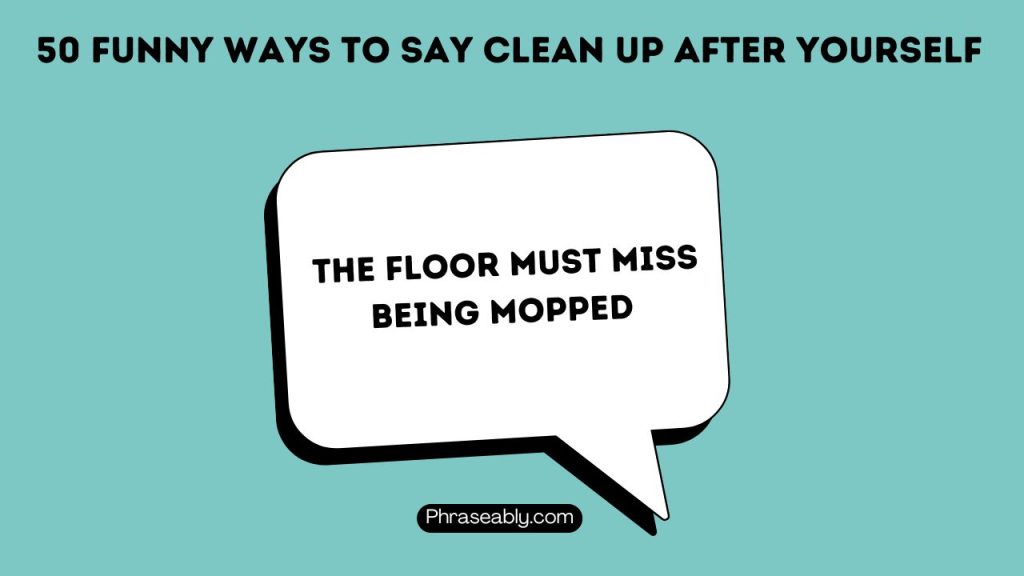
For those people who have floors that are tiled or with no rugs, this would be a good and funny way to share with your partner or roommate that they should mop or clean the floor.
How To Use:
- The floor must miss being mopped, oh! Poor floor.
Are you sure you have a nose to smell this mess and the eyes to see it?
Asking an obvious question could make the person you’re asking laugh, which this phrase uses as a means to say that a person should clean up after himself or herself.
How To Use:
- Are you sure you have a nose to smell this mess and the eyes to see it, clean it up dude.
